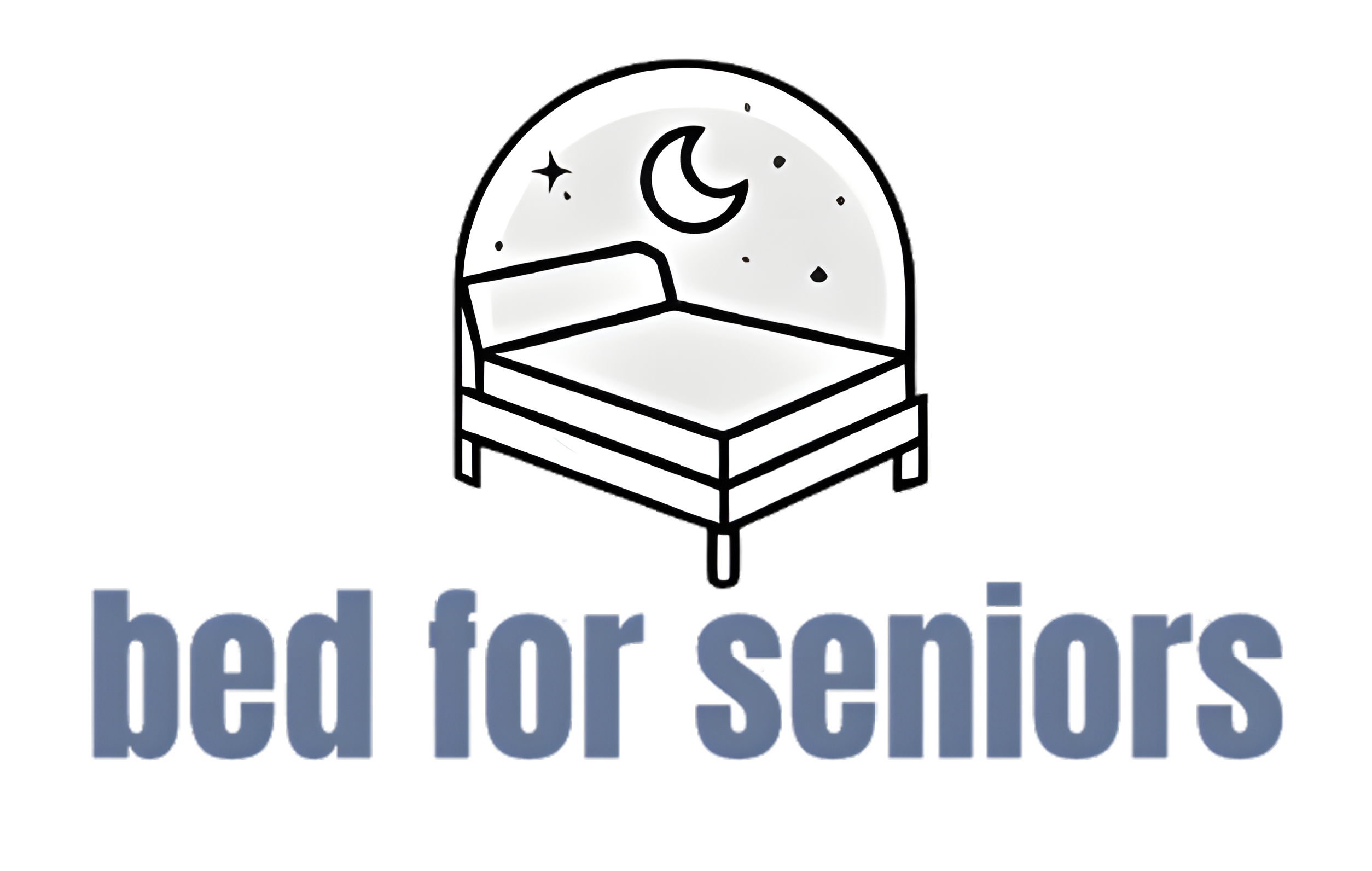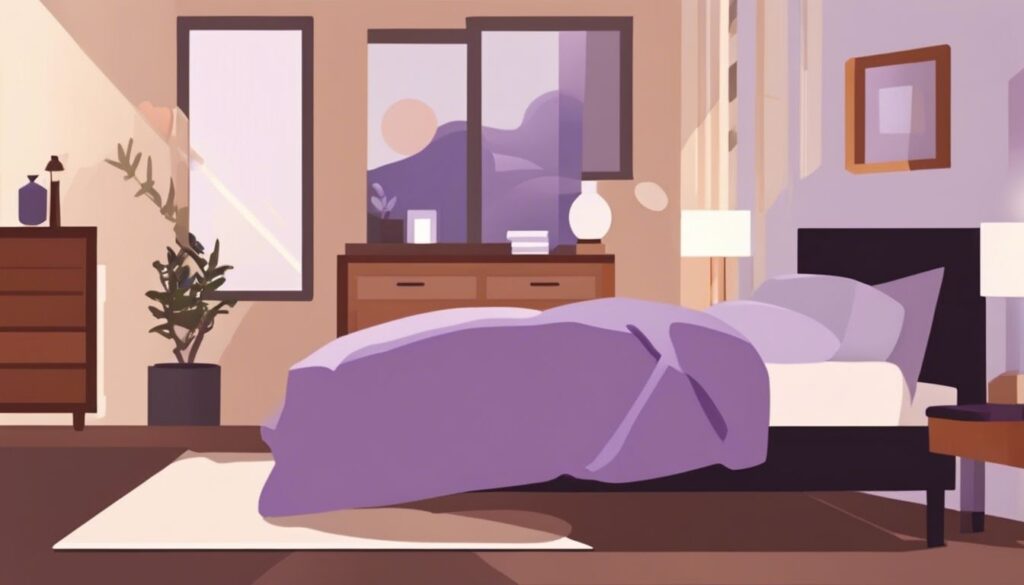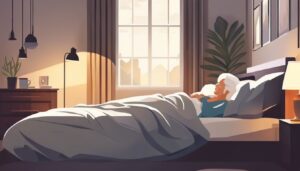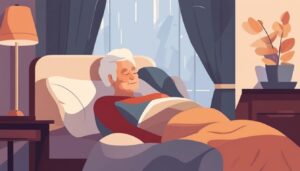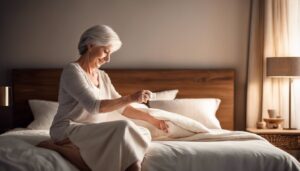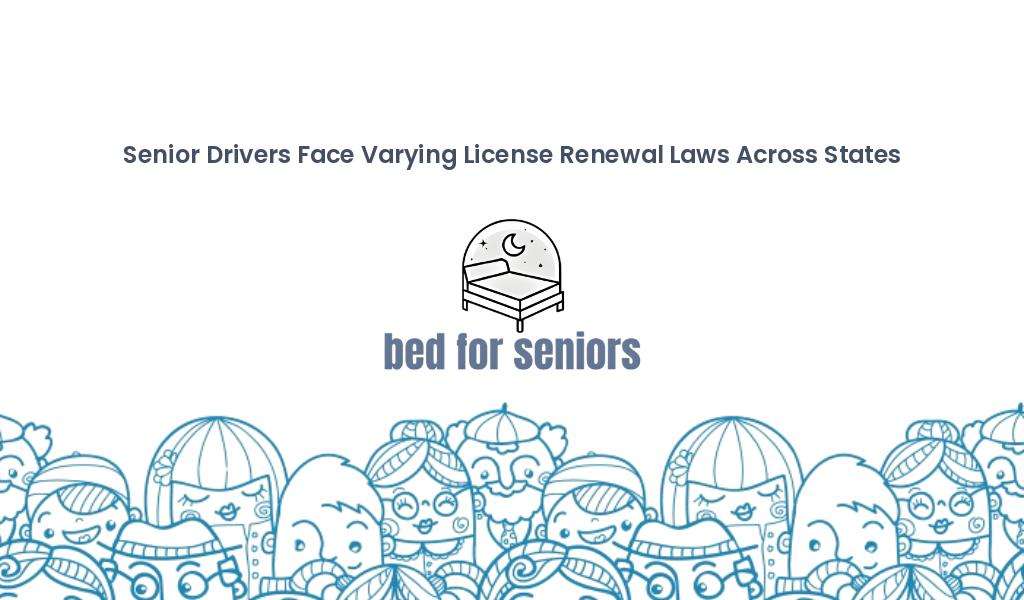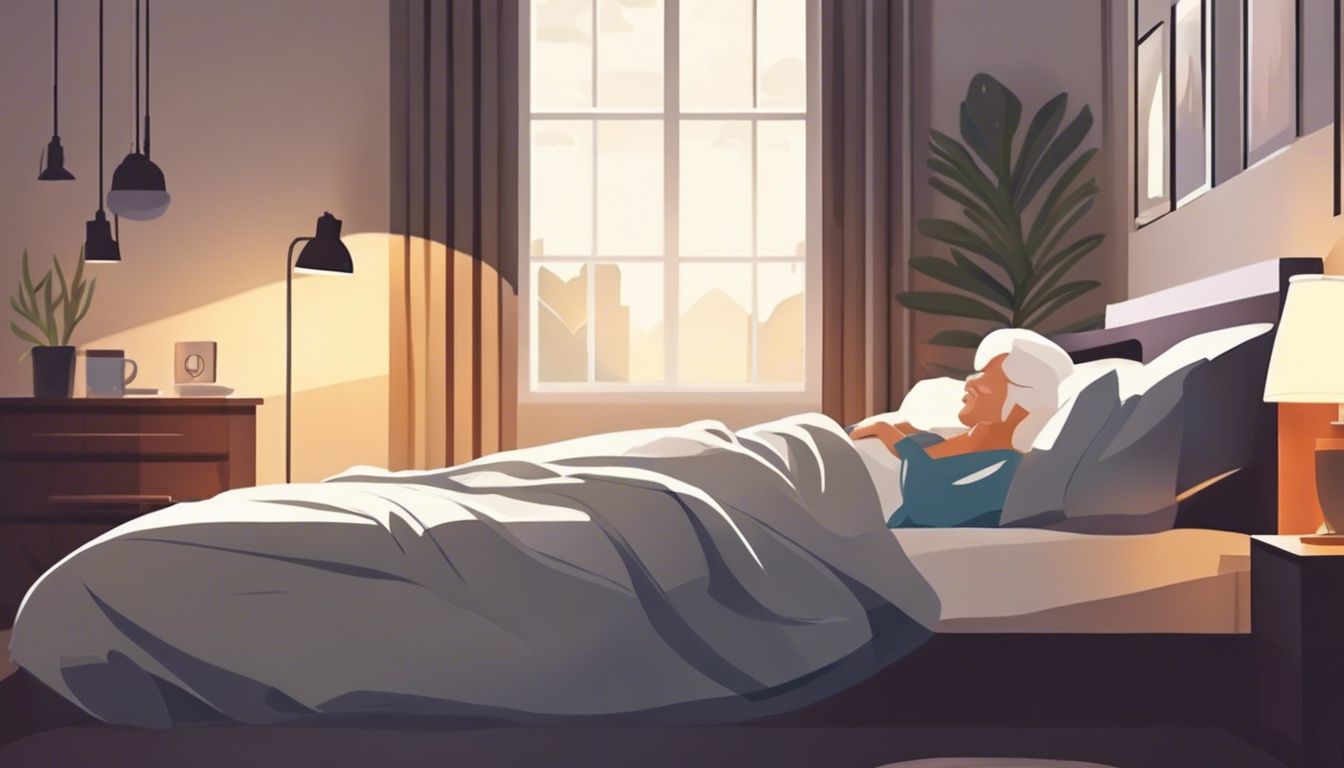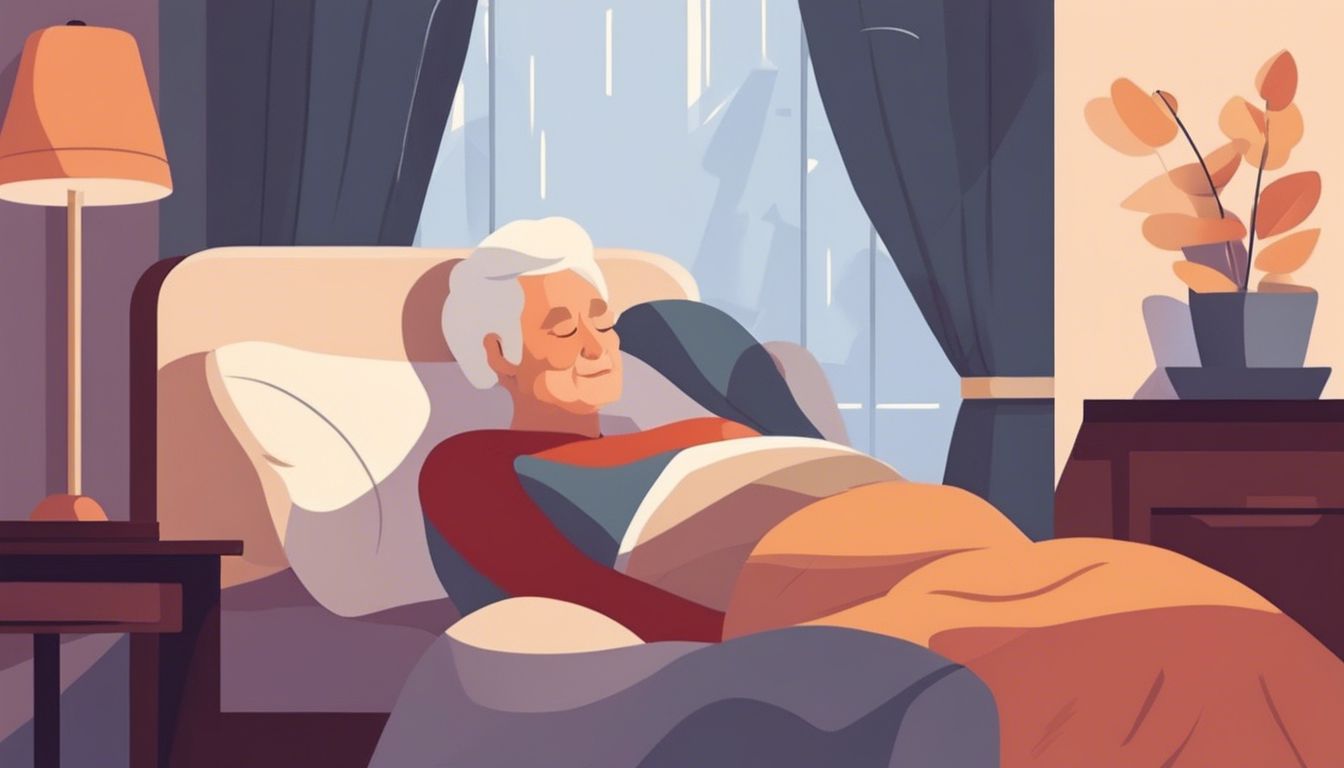Getting a good night’s sleep can be tough for many seniors. Over 33% of adults don’t get enough sleep, according to the CDC. This blog will explore natural ways to improve sleep quality for older adults.
Ready to catch some Z’s?
📋✅
- Over 33% of adults don’t get enough sleep, according to the CDC. Natural remedies like bedtime routines, CBT-I, and physical activity can help seniors sleep better without harsh drugs.
- Herbal supplements such as lavender, melatonin, and valerian root may improve sleep quality for older adults, but potential side effects should be discussed with a doctor first.
- Mindfulness meditation, acupuncture, and warm milk or chamomile tea before bed are gentle ways to promote relaxation and ease into sleep for seniors.
- Creating a senior-friendly bedroom with proper temperature (65-72°F), lighting, and safety features can significantly improve sleep quality and reduce fall risks.
- Natural sleep remedies have fewer side effects than sleeping pills and address root causes rather than just masking symptoms, making them safer long-term options for seniors.
Key Natural Strategies for Better Sleep
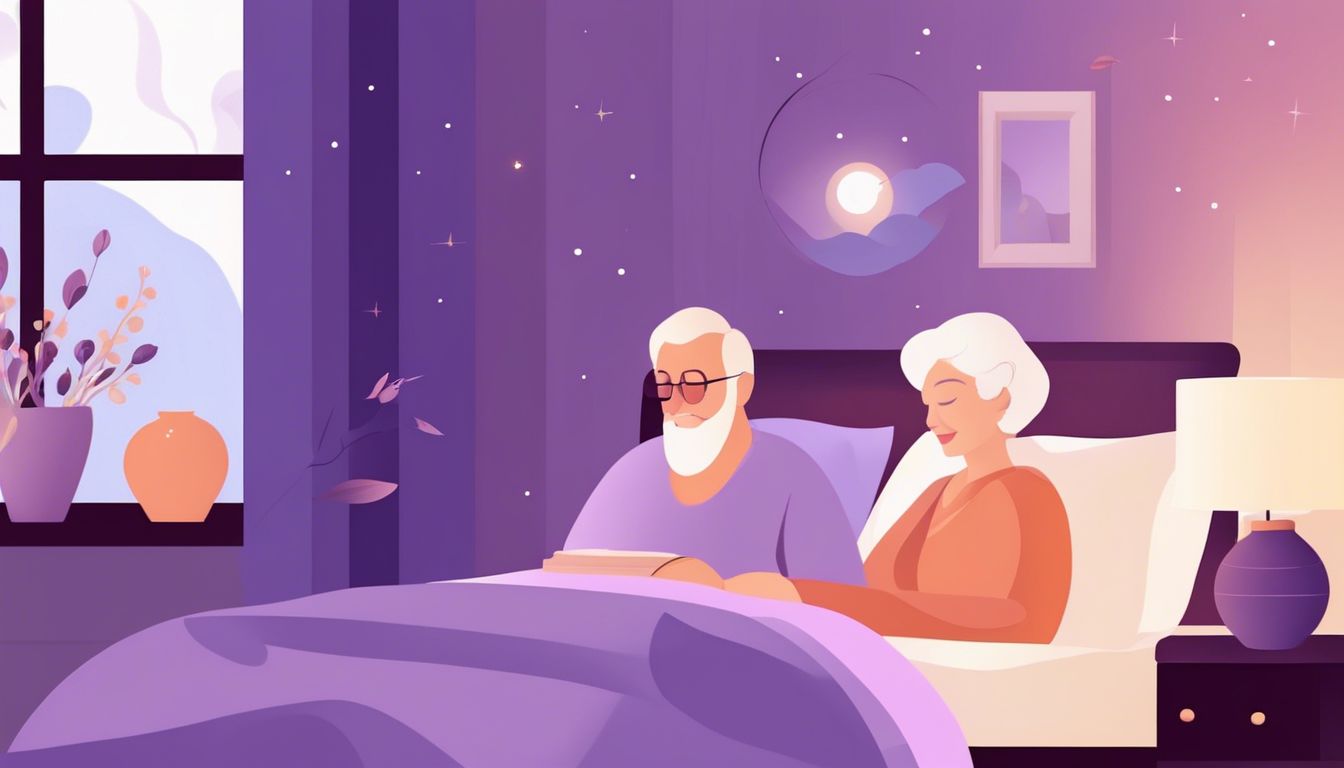
Natural sleep remedies can transform a senior’s night. They offer gentle, effective ways to improve rest without harsh drugs.
Creating a bedtime routine
Establishing a consistent bedtime routine helps seniors wind down and prepare for sleep. This ritual signals the body it’s time to rest, promoting better sleep quality. A good routine might include light stretching, reading a book, or listening to calming music.
These activities reduce stress and anxiety, common sleep disruptors in older adults.
Caregivers can assist seniors in developing and maintaining these routines. Setting a regular bedtime and wake-up time reinforces the body’s natural sleep-wake cycle. Avoiding screens before bed and creating a cool, dark sleeping environment also supports better sleep.
A warm bath or shower an hour before bed can help lower body temperature, aiding the natural sleep process.
A good laugh and a long sleep are the best cures in the doctor’s book. – Irish Proverb
Cognitive Behavioral Therapy for Insomnia (CBT-I)
Cognitive Behavioral Therapy for Insomnia (CBT-I) offers a powerful, drug-free approach to tackling sleep issues in seniors. This method targets the thoughts and behaviors that interfere with rest, helping older adults develop healthier sleep patterns.
CBT-I typically involves keeping a sleep diary, learning relaxation techniques, and changing habits that disrupt sleep.
Medical experts widely endorse CBT-I as the go-to treatment for chronic insomnia in older adults. Research shows it’s effective for over 75% of insomnia patients, often producing lasting results within 4-8 weeks.
Unlike sleeping pills, CBT-I has no physical side effects and addresses the root causes of sleep problems rather than just masking symptoms.
Staying active during the day
Regular physical activity is crucial for seniors’ sleep quality. The CDC recommends specific activity goals for adults 65 and older. These include 150 minutes of moderate-intensity aerobic exercise or 75 minutes of vigorous-intensity aerobic activity weekly.
Seniors can enjoy walking, yoga, swimming, dancing, or gardening to meet these targets.
Starting small is key. Seniors should begin with realistic goals and gradually increase their activity levels over time. This approach helps build endurance and strength safely. Physical exercise during the day promotes better sleep at night, reducing sleep disturbances and improving overall sleep hygiene.
Effective Herbal and Natural Supplements
Herbal remedies offer a gentle approach to improving sleep quality in seniors. Many seniors find relief from insomnia through natural supplements like lavender, melatonin, and valerian root.
Lavender
Lavender, a fragrant purple flower, offers more than just a pleasant scent. Research shows it can significantly improve sleep quality in older adults. Its calming properties make it a popular choice for aromatherapy in senior care settings.
Caregivers often use lavender essential oil in diffusers or add a few drops to pillowcases to promote relaxation.
Lavender has shown to be effective in improving sleep quality, especially in older adults. – National Sleep Foundation
While lavender is generally safe, caregivers should be aware of potential long-term effects. The National Cancer Institute warns of possible hormonal side effects with prolonged use.
Moving on to another natural sleep aid, let’s explore the benefits of melatonin supplements for seniors.
Melatonin
Melatonin, a hormone naturally produced by the pineal gland, plays a crucial role in regulating sleep-wake cycles. For seniors struggling with sleep issues, melatonin supplements may offer some benefits.
Research indicates that melatonin can help with certain sleep disorders, though its effectiveness for general insomnia needs more study.
Caregivers should be aware of potential side effects. These include headaches, daytime drowsiness, stomach discomfort, and worsening depression symptoms. Pregnant or nursing individuals must consult a doctor before using melatonin.
It’s important to weigh the pros and cons and discuss with a healthcare provider before starting any new sleep aid regimen.
Valerian root
Valerian root, a perennial flowering plant, has gained attention as a natural sleep aid. This herb may help seniors with insomnia, especially those dealing with anxiety or depression.
Its potential benefits stem from compounds that interact with gamma-aminobutyric acid (GABA) receptors in the brain, promoting relaxation and sleep. However, research on its effectiveness remains limited, as noted in a 2020 study published in the Journal of Evidence-Based Integrative Medicine.
Caregivers should know that valerian root comes in various forms – teas, capsules, and liquid extracts. While generally considered safe, it can cause side effects like headaches or stomach upset in some people.
It’s crucial to consult a healthcare provider before adding this supplement to a senior’s routine, particularly if they’re taking other medications or have existing health conditions.
Other Natural Remedies to Consider
Explore gentle, non-invasive methods to improve sleep quality. These approaches offer natural alternatives without the risks of medication….
Mindfulness meditation
Mindfulness meditation offers seniors a powerful tool for improving sleep quality. This practice involves focusing on the present moment, often by paying attention to breathing or bodily sensations.
Research from Harvard Health Publishing shows it can help calm racing thoughts and reduce stress – common culprits behind sleepless nights.
Caregivers can guide their elderly loved ones through simple mindfulness exercises before bedtime. A five-minute session of deep breathing or body scanning may promote relaxation and ease the transition into sleep.
For those struggling with chronic insomnia, longer guided meditations or enrolling in a mindfulness-based stress reduction program could prove beneficial. The next section explores other natural remedies worth considering for better sleep in seniors.
Acupuncture
Moving from meditation to physical therapies, acupuncture offers another approach for seniors seeking better sleep. This ancient Chinese practice involves inserting thin needles into specific body points.
Research suggests it may help some older adults improve their rest quality. The National Center for Complementary and Integrative Health notes acupuncture’s potential benefits come with few side effects.
For caregivers, this could mean a safe option to explore with their senior loved ones. Some find the treatments relaxing, which may ease bedtime anxiety. Others report falling asleep faster after sessions.
While more studies are needed, acupuncture’s low-risk profile makes it worth considering for sleep-troubled seniors.
Warm milk and chamomile tea
Moving from acupuncture, we find other soothing options for better sleep. Warm milk and chamomile tea stand out as time-tested remedies. Dr. Charlene Gamaldo of Johns Hopkins Center for Sleep backs these choices.
Milk contains tryptophan, an amino acid that may help induce sleep. German chamomile tea offers anti-inflammatory and anti-bacterial properties. It’s best enjoyed as a hot brew before bed.
These drinks can be part of a calming nighttime routine, easing seniors into restful slumber without harsh side effects.
Senior-Friendly Bedroom Design Ideas
Creating a sleep-friendly environment is crucial for seniors. Optimal bedroom design can significantly improve sleep quality and safety. The ideal room temperature for sleep ranges between 65 and 72 degrees Fahrenheit.
Adjustable bedding and layered clothing allow for easy temperature regulation throughout the night. Nightlights or motion-activated lights in hallways and bathrooms provide safety without disrupting sleep patterns.
Using flashlights instead of bright overhead lights during nighttime bathroom breaks helps maintain drowsiness.
Furniture placement plays a key role in senior-friendly bedroom design. Positioning the bed against a wall offers support and reduces fall risks. Removing clutter and ensuring clear pathways minimize tripping hazards.
Installing grab bars near the bed and in the bathroom enhances mobility and independence. Blackout curtains or shades can block out disruptive light, promoting better sleep. Soft, warm lighting creates a relaxing atmosphere conducive to rest.
Comparing Natural Remedies with Sleeping Pills
Natural remedies offer a gentler approach to sleep issues, often with fewer side effects than prescription medications. Sleeping pills may provide quick relief but can lead to dependency and other health concerns over time.
Benefits of natural remedies over medication
Natural sleep remedies offer several advantages over prescription medications for seniors. They’re often gentler on the body and have fewer side effects. Herbal supplements like lavender and melatonin can promote relaxation without the risk of dependency or morning grogginess associated with some sleep drugs.
Lifestyle changes – such as establishing a bedtime routine or practicing mindfulness – address the root causes of sleep issues rather than just masking symptoms.
For caregivers, natural approaches provide safer long-term solutions for their loved ones. They avoid potential drug interactions and reduce the risk of falls or confusion that can occur with sedatives.
Non-pharmaceutical methods like CBT-I or acupuncture may also improve overall sleep quality and daytime functioning. With over 60 million Americans struggling with poor sleep, these gentler alternatives offer hope for better rest without relying on habit-forming medications.
Restful sleep remains crucial for seniors’ health and well-being. Natural remedies offer safe, effective alternatives to prescription sleep aids. From herbal supplements to lifestyle changes, many options exist to improve sleep quality.
Caregivers play a vital role in helping seniors implement these strategies. With patience and consistency, better sleep is within reach for older adults seeking natural solutions.
For more tips on creating a peaceful sleeping environment, check out our guide on senior-friendly bedroom design ideas.
FAQs
1. What natural sleep aids can help seniors with trouble sleeping?
Seniors struggling with sleep can try several natural remedies. Melatonin supplements may help regulate sleep-wake cycles. Tart cherry juice boosts melatonin levels naturally. Lavender essential oil can promote relaxation. CBD oil might ease anxiety and improve sleep quality. For those dealing with menopause-related sleep issues, these options may offer relief without the side effects of pharmaceutical sleep aids.
2. How can dietary changes improve sleep in older adults?
Eating habits play a big role in sleep quality. Cutting back on caffeine and alcohol can help. Some foods boost serotonin production, aiding sleep. Tart cherries are rich in melatonin. Kiwis contain sleep-promoting compounds. A light snack before bed might help – but avoid heavy meals. Proper hydration matters too, but limit fluids close to bedtime to prevent nighttime bathroom trips.
3. Are over-the-counter sleep medications safe for seniors?
OTC sleep aids like diphenhydramine (Benadryl, ZzzQuil) or doxylamine succinate (Unisom SleepTabs) can help short-term. But they’re not ideal for long-term use in seniors. They can cause side effects like daytime drowsiness, confusion, and dry mouth. Some may worsen conditions like high blood pressure. Always check with a doctor before starting any new sleep medication.
4. How does physical activity affect sleep in older adults?
Regular exercise has amazing benefits for senior sleep. It helps regulate circadian rhythms and can increase total sleep time. Even light activity like walking can make a difference. Aim for at least 30 minutes of movement daily – but not too close to bedtime. Exercise also helps manage conditions that can disrupt sleep, like obesity and heart disease.
5. Can mindfulness practices improve sleep for seniors?
Absolutely! Techniques like meditation and deep breathing can calm the mind and prepare the body for sleep. They help reduce stress and anxiety, common sleep disruptors. Try a guided relaxation app or simple breathing exercises before bed. Some find gentle yoga or tai chi helpful too. These practices can be especially beneficial for those with insomnia symptoms or other sleep disorders.
6. What role does light exposure play in senior sleep patterns?
Light exposure is crucial for maintaining healthy sleep-wake cycles. Seniors should aim for bright light exposure during the day, especially in the morning. This helps regulate circadian rhythms. In the evening, dim lights and limit blue light from screens. Consider blackout curtains or a sleep mask for a dark sleep environment. For those with delayed sleep-wake phase disorder or jet lag, light therapy might help reset the body’s internal clock.
